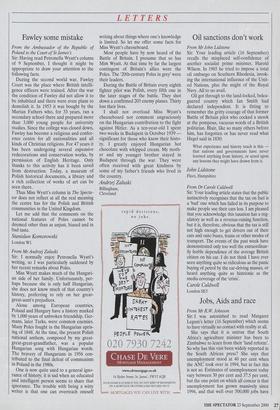From Mr Andrzej Zaluski Sir: I normally enjoy Petronella Wyatt's
writing, so I was particularly saddened by her recent remarks about Poles.
Miss Wyatt makes much of the Hungari- an side of her family. Unfortunately, per- haps because she is only half Hungarian, she does not know much of that country's history, preferring to rely on her great- great-aunt's prejudices.
Alone among European countries, Poland and Hungary have a history marked by 1,000 years of unbroken friendship. Ger- mans, later Turks, were common enemies. Many Poles fought in the Hungarian upris- ing of 1848. At the time, the present Polish national anthem, composed by my great- great-great-grandfather, was a popular Hungarian song with Hungarian words. The bravery of Hungarians in 1956 con- tributed to the final defeat of communism in Poland in the 1980s.
One is now quite used to a general igno- rance of history; it is sad when an educated and intelligent person seems to share that ignorance. The trouble with being a witty writer is that one can overreach oneself writing about things where one's knowledge is limited. So let me offer some facts for Miss Wyatt's cheeseboard.
Most people have by now heard of the Battle of Britain. I presume that so has Mist Wyatt. At that time by far the largest contingent of Britain's allies were the Poles. The '20th-century Poles in grey' were their leaders.
During the Battle of Britain every eighth fighter pilot was Polish, every fifth one in the later stages of the battle. They shot down a confirmed 203 enemy planes. Thirty lost their lives.
I shall not overload Miss Wyatt's cheeseboard nor comment ungraciously on the Hungarian contribution to the fight against Hitler. As a ten-year-old I spent two weeks in Budapest in October 1939 significant for those who know their histo- ry. I greatly enjoyed Hungarian hot chocolate with whipped cream. My moth- er and my younger brother stayed in Budapest through the war. They were often received with great kindness by some of my father's friends who lived in the country.






















































































 Previous page
Previous page